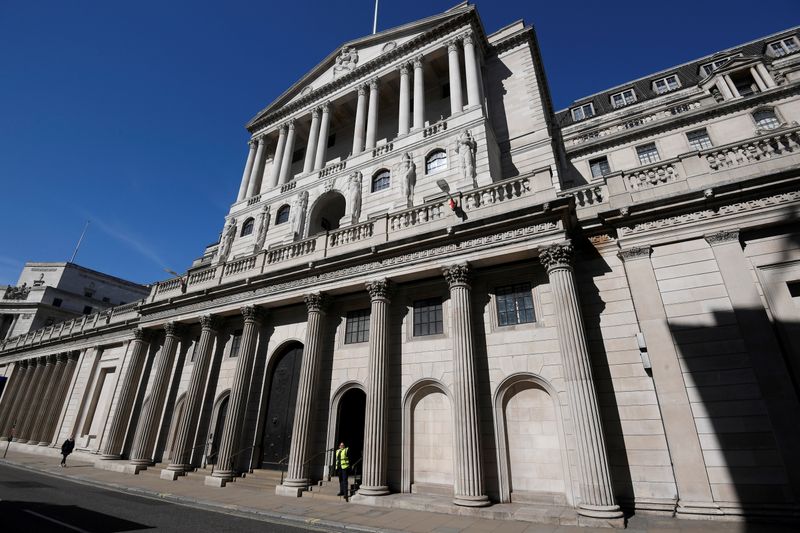By David Milliken
LONDON (Reuters) - The Bank of England will announce its June interest rate decision at 1100 GMT on Thursday in the shadow of a bigger-than-expected rise in consumer price inflation in May to 2.1%, just above its target and the highest since 2019 https://www.reuters.com/world/uk/uk-inflation-rises-21-may-2021-06-16.
Following are highlights of Bank of England policymakers' recent comments about inflation and the outlook for rates and the wider economy.
ANDREW BAILEY, GOVERNOR
May 23: "We are going to have to be looking at the entrails of the inflation evidence very carefully from now onwards."
"If we were to see signs that pricing pressure was becoming more generalised, then for me that would be a signal which would cause us to then have to evaluate where we were in terms of guidance, and at what point the guidance falls away."
May 13: "The really big question is: 'Is (higher inflation) going to persist or not?' Our view is that on the basis of what we're seeing so far, we don't think it is."
DAVE RAMSDEN, DEPUTY GOVERNOR (MARKETS & BANKING)
June 1: "If (inflation is) not temporary we know what to do about that. We can push bank rate up from its historically low level and we know what that will do to demand."
BEN BROADBENT, DEPUTY GOVERNOR (MONETARY POLICY)
April 24: "The price rises for those hitting capacity limits are going to be bigger than the falls in prices for those seeing falls in demand.... When you get the shift in demand, you're going to run into bottlenecks in some areas, particularly in those areas where supply, too, has been hit for a particular reason."
JON CUNLIFFE, DEPUTY GOVERNOR (FINANCIAL STABILITY)
June 4: "What we're seeing is a strong bounce-back of activity.... People have accumulated a lot of savings, they're going out and they're spending, particularly in those areas where we couldn't go out in the last year or so."
ANDY HALDANE, CHIEF ECONOMIST
June 9: "If wages and prices begin a game of leapfrog, we will get the sort of wage-price spiral familiar from the 1970s and 1980s.... In my view this is the most dangerous moment for monetary policy since inflation-targeting was first introduced into the UK in 1992 after the European Exchange Rate Mechanism debacle."
GERTJAN VLIEGHE, EXTERNAL MEMBER
May 27: "The first rise in Bank Rate is likely to become appropriate only well into next year, with some modest further tightening thereafter.... It would probably take until the first quarter of next year to have a clear view of the post-furlough unemployment and wage dynamics."
MICHAEL SAUNDERS, EXTERNAL MEMBER
May 24: "The yield curve is in a reasonable place. If events come out more or less in line with the May Monetary Policy Report forecast, then we might need down the road some modest monetary policy tightening, but not yet, and the word is 'modest'."
JONATHAN HASKEL, EXTERNAL MEMBER
May 12: "I am not that worried about inflation."
"There will be lots of record figures of 'record this' and 'record that'. If you jumped down on the trampoline, you know, the trampoline bounces back up again."
"What I think we've got to be much more aware of, and this is important for inflation, is what the medium-term consequences are going to be, and in particular if the economy has a lot of scarring."
SILVANA TENREYRO, EXTERNAL MEMBER

April 12: "One lesson that we learned from the financial crisis is that withdrawing policy support too early can be very costly."
"Withdrawing it too early... can lead to scarring effects on the labour market that would be very costly and slow down growth going forward."